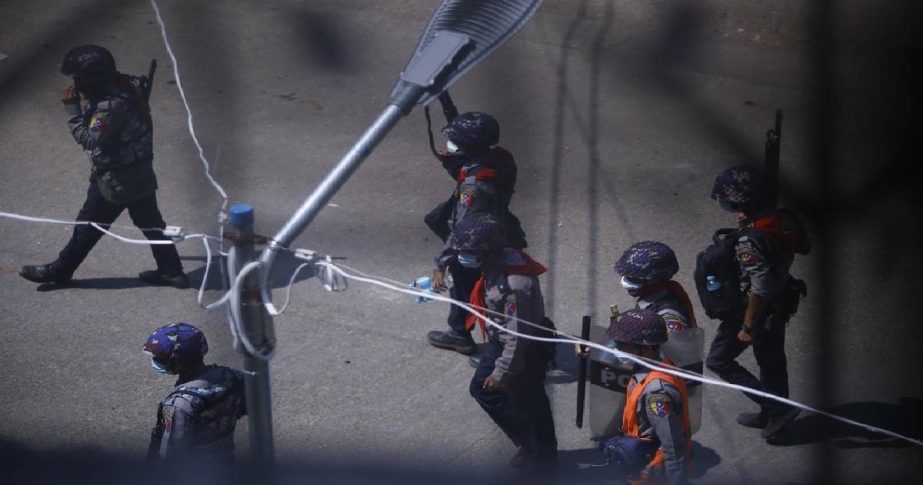
AP:
Two more journalists were detained in Myanmar on Friday, part of the junta’s intensifying efforts to choke off information about resistance to last month’s coup.
Mizzima News reported that one of its former reporters, Than Htike Aung, and Aung Thura, a journalist from the BBC’s Burmese-language service, were detained by men who appeared to be plainclothes security agents outside a court in the capital of Naypyitaw.
The journalists were covering legal proceedings against Win Htein, a detained senior official from the National League for Democracy, the party that ran the country before the takeover.
The coup reversed years of slow progress toward democracy after five decades of military rule. In the face of persistent strikes and protests against the takeover, the junta has responded with an increasingly violent crackdown and efforts to severely limit the information reaching the outside world. Security forces have fired on crowds, killing hundreds, internet access has been severely restricted, private newspapers have been barred from publishing, and protesters, journalists and politicians have been arrested in large numbers.
About 40 journalists have been arrested since the Feb. 1 coup, with roughly half still in detention, including Thein Zaw of The Associated Press.
The increasingly brutal measures taken by the junta drew condemnation from a group of ambassadors from Western countries Friday as well as unusually strong rebukes from leaders in Indonesia and Malaysia.
A statement from the BBC said it is “extremely concerned” that Aung Thura had been taken away by unidentified men.
“The BBC takes the safety of all its staff in Myanmar very seriously and we are doing everything we can to find Aung Thura,” the organization said, adding that he was an accredited journalist with many years of reporting experience. It called on the authorities “to help locate him and confirm that he is safe.”
The reporters were taken into custody a day after Kyi Toe, a spokesman for the National League for Democracy, was arrested, according to a Facebook post by Phyo Zeya Thaw, a party official.
Kyi Toe had been a major source of information in the early days following the Feb. 1 coup, after the ousted civilian government’s de facto leader Aung San Suu Kyi and other senior officials were detained. The takeover came the same day that newly elected lawmakers were supposed to take their seats in Parliament.
Amid a crackdown on the press, no privately-owned newspapers were published this past week for the first time in eight years, following bans and voluntary suspensions. The military government also has banned at least five local news organizations from disseminating information on any platform, but its orders were mostly ignored.
Restrictions on the internet have also been in place since shortly after the coup, including a blockage of mobile internet access. Broadband Wi-Fi service remains available, though spotty.

Despite a crackdown that has killed more than 200 demonstrators so far, protesters were back in the streets Friday morning in several cities and towns. Some rallies proceeded without violence, but in Aungban town in eastern Shan state, online Tachileik News Agency reported that at least seven people were injured when security forces sought to break up their march using tear gas, rubber bullets and live ammunition.
Eleven News, a major media group in Myanmar, reported on Twitter that seven people had been killed in Aungban, but that death toll could not immediately be confirmed, though photos of at least one of the victims were posted on social media.
The independent Assistance Association for Political Prisoners reported that as of Thursday, it had verified 224 killings linked to the coup’s aftermath, more than half of them in Yangon, the biggest city. It said 2,258 people have been arrested or charged, with 1,938 still detained or evading arrest.
Andrew Kirkwood, the acting U.N. humanitarian coordinator in Myanmar, said those killed included at least 15 children, some as young as 14. ”Many people were shot in the head by snipers during peaceful demonstrations,” he said in a video briefing to U.N. correspondents in New York.
Kirkwood said security forces arrested at least 2,400 people — a slightly higher number than was reported by the Assistance Association for Political Prisoners.
“The vast majority of these people are held incommunicado still, and there are increasing reports of sexually based violence against them,” he said.
A group of ambassadors from Western countries called the violence “immoral and indefensible” in a statement Friday.
“Internet blackouts and the suppression of the media will not hide the military’s abhorrent actions,” read the statement from ambassadors to Myanmar from the European Union, several EU countries, Britain and the United States.
Myanmar’s neighbors had been more tentative in their response. But Indonesian President Joko Widodo issued a strong statement on Friday, urging a halt to violence and asking other regional leaders to hold a summit on the crisis.
“Indonesia urges that the use of violence in Myanmar be stopped immediately to avoid more victims. The safety and welfare of the people must be a top priority,” Widodo said in a televised address. “Indonesia also urges dialogue and reconciliation to be carried out immediately to restore democracy, peace and stability in Myanmar.”
Malaysia’s Prime Minister Muhyiddin Yassin supported Widodo’s call for an ASEAN summit, saying he was “appalled by the persistent use of lethal violence against unarmed civilians, which has resulted in a high number of deaths and injuries, as well as suffering across the nation.”
“The military leadership in Myanmar is strongly urged to change its course, and choose a path towards peaceful solutions,” said Muhyiddin. “We in Malaysia, and the larger ASEAN community, cannot afford to see our brotherly nation of Myanmar become so destabilized at the hands of a selected few, who seek to promote their own vested interests.”

